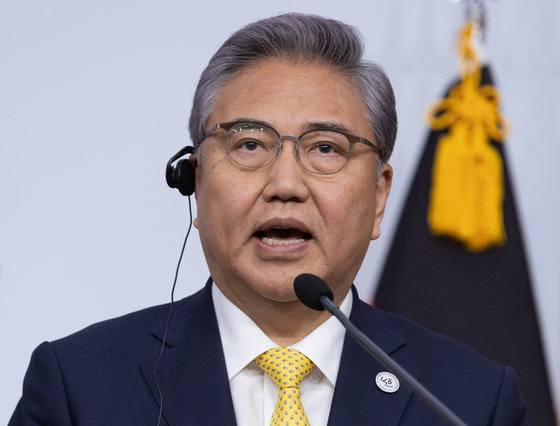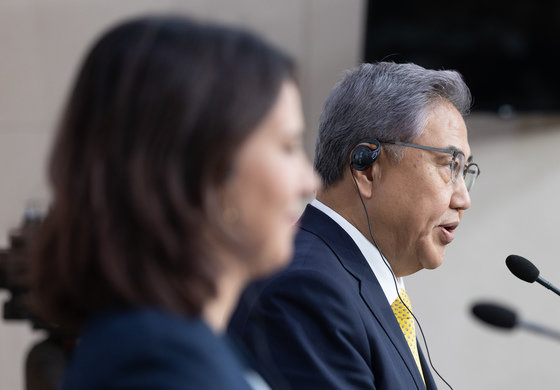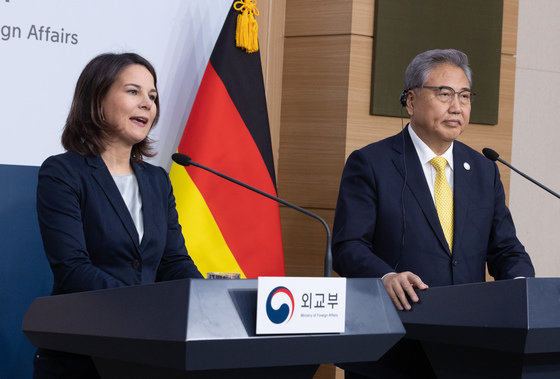The foreign ministers of Korea and Germany met in Seoul on the 15th to discuss aid to Ukraine, North Korea’s nuclear and missile threats, cooperation in the Indo-Pacific region, and bilateral relations.
According to the Ministry of Foreign Affairs, Minister Jin Park held a strategic dialogue between the foreign ministers of Korea and Germany with German Foreign Minister Annalena Verbock at the Ministry of Foreign Affairs in Seoul on the same day and exchanged views on issues of common interest.
In a press briefing after the strategic dialogue, Minister Park said, “Both sides expressed concerns about the deteriorating humanitarian and economic situation in Ukraine, and agreed that solidarity and support from the international community is more important than ever.” We decided to cooperate on economic measures,” he said.
 Foreign Minister Park Jin speaks at a joint press conference on the strategic dialogue between the Korean and German foreign ministers held at the Ministry of Foreign Affairs in Jongno-gu, Seoul on the afternoon of the 15th. 2023.4.15/News 1
Foreign Minister Park Jin speaks at a joint press conference on the strategic dialogue between the Korean and German foreign ministers held at the Ministry of Foreign Affairs in Jongno-gu, Seoul on the afternoon of the 15th. 2023.4.15/News 1 Minister Park added, “Minister Verbock and I agreed that Russia’s armed invasion of Ukraine is an act that violates the UN Charter and international law, and that Ukraine’s sovereignty, territorial integrity and independence must be respected.”
German reporters who attended the briefing asked a question to the effect that “the Republic of Korea should take a little stronger part in supporting shells and weapons,” but the foreign ministers of Korea and Germany did not give a specific answer. Despite Ukraine’s repeated requests for arms and ammunition support, the South Korean government has made it clear that it can only support “non-lethal” military supplies.
Minister Verbock said, “We are trying to further strengthen cooperation with many countries, such as the Republic of Korea, which share the same values as ours.” ” he said.
Minister Verbock said, “In October of last year, we announced policy guidelines regarding arms supply.
 Foreign Minister Park Jin speaks at a joint press conference on the strategic dialogue between the Korean and German foreign ministers held at the Ministry of Foreign Affairs in Jongno-gu, Seoul on the afternoon of the 15th. 2023.4.15/News 1
Foreign Minister Park Jin speaks at a joint press conference on the strategic dialogue between the Korean and German foreign ministers held at the Ministry of Foreign Affairs in Jongno-gu, Seoul on the afternoon of the 15th. 2023.4.15/News 1 Minister Park introduced the fact that the ROK government promised to provide $130 million in aid to Ukraine this year, following $100 million last year, and said, “Through this, humanitarian aid, financial support for Ukraine, support for infrastructure construction, and support for reconstruction are provided. We will continue,” he said.
He also said, “The Korean government explained to Minister Verbock that it is considering various possible support measures that can contribute to ending the war and restoring peace in Ukraine.”
Minister Verbock expressed his appreciation, saying, “The Republic of Korea not only strongly criticized the Russian aggression, but also participated in the sanctions and suffered the economic cost of it. We will not forget this.”
During the strategic dialogue that day, Minister Park said that North Korea has recently launched a missile that it claims to be a “Hwaseongpo-18” intercontinental ballistic missile (ICBM) based on a new solid fuel propulsion system and continues to aggravate the situation on the Korean Peninsula by threatening additional provocations. It was also emphasized that Korea and Germany should unite with the international community and respond decisively.
Minister Park explained, “I asked for unwavering support for the South Korean government’s policy toward complete denuclearization of North Korea.”
He said, “We urged North Korea to stop provocations in response to the ‘Bold Initiative’ and return to denuclearization dialogue as soon as possible.” We have decided to work together with the international community to achieve this goal.”
 German Foreign Minister Annalena Bae Eo-bok speaks at a joint press conference on the Korea-Germany Foreign Ministers Strategic Dialogue held at the Ministry of Foreign Affairs in Jongno-gu, Seoul on the afternoon of the 15th. On the right is Foreign Minister Park Jin. 2023.4.15/News 1
German Foreign Minister Annalena Bae Eo-bok speaks at a joint press conference on the Korea-Germany Foreign Ministers Strategic Dialogue held at the Ministry of Foreign Affairs in Jongno-gu, Seoul on the afternoon of the 15th. On the right is Foreign Minister Park Jin. 2023.4.15/News 1 “I started my visit to South Korea from the Demilitarized Zone (DMZ),” said Minister Verbock. Europe forgot that South Korea is always under the threat of missile terrorism.”
Minister Verbock said, “The missile launch, which is in violation of international law, cannot be justified by anything and is a real threat to the security of the Indo-Pacific region.” We will not sit idly by,” he stressed.
In addition, Minister Verbock said, “The two countries have very close commonalities and connections in the emotional aspect, and the people of the Republic of Korea continue to experience division in their daily lives.” You can be sure of it,” he said.
During the strategic dialogue, the two ministers discussed cooperation between the two countries’ Indo-Pacific strategies, focusing on the “Indo-Pacific Strategy of Freedom, Peace and Prosperity” announced by the Korean government last year and the policy guidelines for the Indo-Pacific region announced by the German government in 2020. They also agreed to explore possible fields.
Minister Park said, “I think this strategic dialogue served as an opportunity to seek ways to promote bilateral cooperation under the Yoon Seok-yeol government’s global pivotal national vision, foreign policy, and Indo-Pacific strategy.”
Regarding Korea-Germany relations, Minister Park said, “We share common values such as freedom, human rights, democracy, and a free market economy. Germany is our largest trading partner and an important partner in Europe. As a global innovative country, we are sharing values together.”
Minister Park said, “This year, in commemoration of the 140th anniversary of diplomatic ties between Korea and Germany, we have decided to make efforts to strengthen high-level exchanges between the two countries.” We agreed that we need to do this, and we agreed to continue close dialogue and cooperation in the fields of economic security, artificial intelligence, and advanced technology.”
“Exactly 60 years ago, Korea’s first migrant workers came to Germany,” said Minister Verbock.
“We will continue to strengthen our economic ties,” said Minister Verbock.
On this day, Minister Park explained Busan’s hosting capacity and the full support of the Korean government in connection with the promotion of the 2030 Busan World Expo, and also requested, “Considering the high enthusiasm of the entire public, please actively consider the Busan candidacy.”
During the strategic dialogue that day, it was reported that the two sides also discussed foreign policy toward China. Minister Verbock held talks with Chinese Foreign Minister Qin Gang in Beijing the day before.
Minister Verbock explained, “China is both a competitor and a system rival. It is important to reduce economic risks in China, and (Germany’s) China strategy is not aimed at a specific country.”
Minister Park urged, “China is also one of the key countries in the Intai region, and I hope that China can contribute to the peace, prosperity, and sustainable development of the Intai region while fulfilling its responsibilities as a member of the international community.”
On the other hand, Minister Behrbok said, “There is something I personally want to appreciate, but the relationship between Korea and Japan has become closer.”
The two sides agreed to hold the next strategic dialogue at a mutually convenient time in Berlin, Germany, based on the content discussed at the strategic dialogue.
Source: Donga
Mark Jones is a world traveler and journalist for News Rebeat. With a curious mind and a love of adventure, Mark brings a unique perspective to the latest global events and provides in-depth and thought-provoking coverage of the world at large.